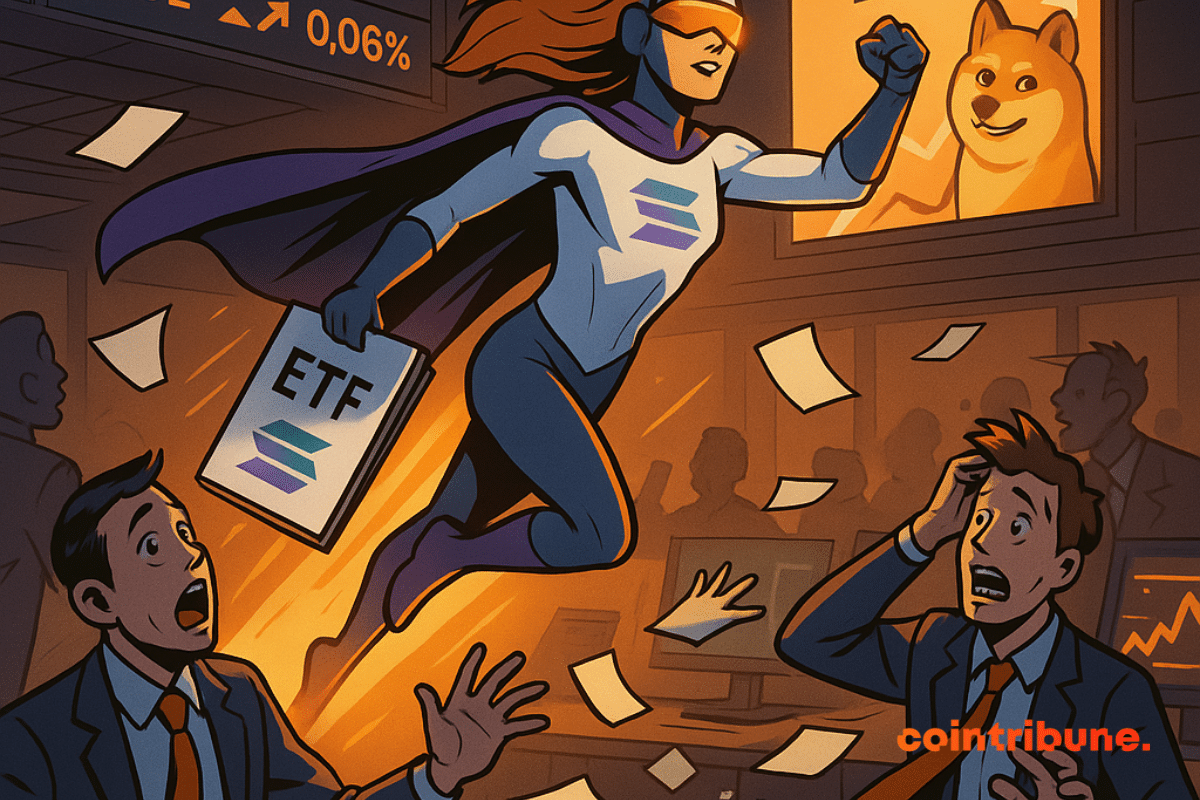Solana and Dogecoin Lead the Charge in New Crypto ETFs
VanEck’s Solana ETF has officially entered the market, signaling a significant influx of cryptocurrency funds onto traditional stock exchanges. With Solana and soon Dogecoin at the forefront, the landscape of crypto investment is rapidly evolving. This new wave of products is characterized by competitive fee structures, integrated staking mechanisms, and a race against regulatory timelines, all unfolding within the established framework of traditional finance.
In brief
- •VanEck has launched its Solana ETF (VSOL), featuring integrated staking and temporarily waived fees, in an increasingly competitive market for Solana-based products, with Fidelity also intensifying its presence.
- •Grayscale is in the process of converting its Dogecoin Trust into the first spot Dogecoin ETF in the United States, while more complex offshore structures for Dogecoin ETFs already exist.
- •These new altcoin ETFs are redirecting investment flows towards Wall Street and necessitate a thorough evaluation of their fees, liquidity, staking capabilities, and regulatory compliance.
VanEck's Aggressive Approach to its Solana ETF
VanEck has launched its Solana ETF, branded as VSOL, entering a market that already includes offerings from Bitwise and Grayscale. Recognizing the need to attract significant capital, VanEck has adopted an aggressive strategy centered on two key advantages. Firstly, the VanEck Solana ETF offers Solana staking yields, as a portion of the underlying SOL is staked on the blockchain to generate rewards. Secondly, the ETF's management fees, initially set at 0.3%, are temporarily waived until February 17 or until the total assets under management reach a symbolic cap of one billion dollars.
The integration of staking allows traditional investors, who may prefer to avoid the complexities of managing seed phrases and crypto wallets, to capture on-chain yield directly within their brokerage accounts. This represents a form of "DeFi packaged for Wall Street," simplifying the process for both fund managers and individual investors by eliminating the need to understand the intricate technical details of Solana to benefit from its ecosystem.
The recent relaxation of listing standards for crypto ETFs by the SEC in September has reduced friction and expedited approval processes, leading to a surge in new product launches. Asset managers are actively capitalizing on this opportunity. Solana, now recognized as a primary competitor to Ethereum, has become a strategic asset for those investing in the future of high-performance blockchains. Consequently, a Solana ETF provides a regulated pathway into this burgeoning ecosystem.
Fidelity Intensifies Competition on Solana as Dogecoin ETFs Emerge
The introduction of Fidelity's Solana ETF (FSOL) further escalates the competitive landscape. Fidelity's entry signifies a significant move, intensifying the competition on fees, liquidity, and the capacity to attract institutional investors, particularly in light of existing Solana ETFs, including VanEck's. BlackRock has notably remained on the sidelines regarding Solana investments, suggesting that the market is open for other major players to establish leadership in listed altcoins.
Concurrently, Dogecoin is generating substantial market interest. Grayscale is preparing to convert its Grayscale Dogecoin Trust into a spot ETF listed on the NYSE. Should the SEC not raise objections within the designated regulatory period, the market is poised to witness the debut of the first spot Dogecoin ETF in the United States. Unlike certain existing complex products, this ETF will have the direct capability to hold Dogecoin as its underlying asset.
It is important to acknowledge existing initiatives, such as the product offered by REX Shares and Osprey Funds, which is structured under the Investment Company Act of 1940. This regulatory framework necessitates the use of an offshore subsidiary to hold DOGE, resulting in a more convoluted and indirect structure. This situation highlights the ongoing transition from a fragmented legal environment to simpler, more transparent spot ETFs for investors.
The Market Impact of New Altcoin ETFs
While these new ETFs might initially appear as just additional tickers to monitor, they are fundamentally reshaping investment flows within the crypto market. A portion of the capital that would have previously been invested directly in SOL or DOGE on cryptocurrency exchanges will now be channeled through traditional stock markets via these ETFs. This integration opens up possibilities for investment through securities accounts, investment plans, and other structured products, connecting a broader financial universe to these digital assets.
Following the successful launch of Bitcoin and Ethereum ETFs, the path is now open for other major altcoins. Solana is positioned to capture the high-performance infrastructure segment, competing with XRP for a leading position in a crypto market undergoing significant reorganization. Dogecoin, on the other hand, represents the narrative of a meme coin that has gained substantial market capitalization and recognition. Other projects are observing these developments closely, anticipating their potential inclusion in future ETF offerings.

